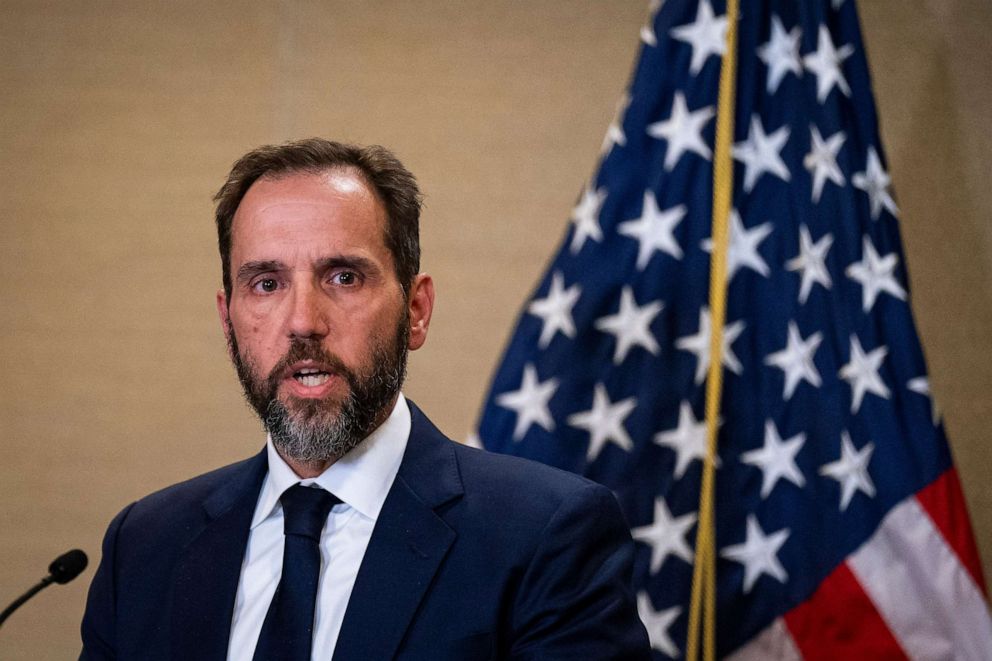前总统唐纳德·特朗普在他被袭击后,他早期的法律辩护开始受到关注另一项联邦起诉这一次与他在2020年后继续掌权的努力有关选举损失。
在1月6日由特别顾问杰克·史密斯提起的案件中,特朗普面临四项重罪指控,其中包括阴谋欺诈美国和妨碍官方诉讼。这位前总统否认有不当行为,并辩称无罪。
本案中出现的关键问题是意图和言论自由。
特朗普的律师声称,特朗普一直认为2020年的选举被盗,并有权根据第一修正案这么说。
法律专家在权衡此案时告诉ABC新闻,史密斯在他45页的起诉书中预见到了这些辩护。
特朗普的心态
“起诉书的大部分内容是试图证明特朗普知道他输掉了选举,并打算推翻选举结果,”前联邦检察官、西海岸审判律师协会(West Coast Trial Lawyers)主席尼马·拉赫马尼(Neama Rahmani)说。
史密斯在起诉书中使用了“故意”一词30多次,因为他指控特朗普实施了一项“犯罪计划”来继续掌权,尽管他很清楚自己关于欺诈的言论是谎言。
川普的律师之一约翰·劳罗,被推回福克斯新闻频道他将“希望他们努力证明唐纳德·特朗普认为这些指控是虚假的。”
特朗普在1月6日左右的精神状态一直备受争议,他今天继续传播关于总统竞选的虚假指控。
前联邦检察官、现任辩护律师莎拉·克里索夫(Sarah Krissoff)说,“意图往往是推断出来的,或者往往是由间接证据显示出来的。”“除非别人告诉你,否则很难知道别人脑子里在想什么,所以你经常不得不从别人的行为或其他证据中推断出他们的意图。”
检察官描述了一系列据称告诉特朗普没有欺诈证据、他在起诉书中败诉的人,写道特朗普“被反复告知他的说法不真实——通常是他在重要问题上依赖的坦诚建议的人,也是最有资格了解事实的人——他故意无视事实。”
他们还列举了据称特朗普似乎承认失败的例子,称他告诉他的一名政府官员,“对我们来说太晚了”,并把问题“留给了下一个人”。他们说,在另一个时刻,特朗普告诉时任副总统迈克·彭斯,他“太诚实了”,因为彭斯无视他拒绝选举结果的提议。
乔治华盛顿大学(George Washington University)法学教授、前美国助理检察官兰德尔·埃利亚松(Randall Eliason)表示,意图问题超出了特朗普是否只是认为他输掉了选举的范围。
“举个例子:我真的认为我的银行敲了我的竹杠,偷了我的存款。这是一个真诚的信念,但这并不意味着我可以去银行抢劫银行。这不是借口,”兰德尔说。“如果你认为你的事业是正义的,那并不意味着你必须违反法律来试图解决它。”
至于特朗普可能辩护说他在选举后依赖法律顾问的建议,埃利亚松指出,这无助于史密斯在起诉书中提到的“共谋者”很可能正是推动特朗普努力保住权力的律师——包括鲁迪·朱利安尼和约翰·伊斯曼。
他说,“你不能与碰巧拥有法律学位的人进行犯罪阴谋,然后声称因此你是免疫的。”"因此,即使法律顾问的建议是一种辩护,它也必须是真诚的."
第一修正案
劳罗在接受福克斯新闻频道采访时声称,这项指控是对第一修正案的“攻击”。
但是根据前助理检察官凯文·奥布莱恩的说法,史密斯在起诉书的前几页“打断了”那场辩论。
起诉书中写道:“和每个美国人一样,被告有权公开谈论选举,甚至错误地声称,选举期间存在决定结果的欺诈行为,他赢了。”起诉书指出,特朗普确实向法院提起了诉讼,并彻底败诉。

2023年8月1日,美国特别顾问杰克·史密斯在新闻发布会上发言。
艾尔·德拉戈/彭博
“如果你愿意,他有每个公民的第一修正案权利以严厉的个人措辞批评选举,”奥布赖恩解释说。但这并不意味着你有权说服他人干涉合法的政府职能,并为了实现这一目的而对他人撒谎。这是不允许的。那叫违法。"
其他法律专家也怀疑言论自由的论点是否站得住脚。
“我认为司法部会说,站在街角表达你对一些事情的看法和与他人达成协议以实现这些所谓的非法结果之间有很大的区别,”克里索夫说。
Criminal intent, free speech emerge as key issues in Trump's Jan. 6 indictment
Former PresidentDonald Trump's early legal defense is coming into focus after he was hit withanother federal indictment, this time in connection to his efforts to remain in power after his 2020electionloss.
Trump faces four felony charges, among them conspiracy to defraud the U.S. and obstruction of an official proceeding, in the Jan. 6 case brought by special counsel Jack Smith. The former president has denied wrongdoing and pleaded not guilty.
Emerging as key issues in the case are intent and free speech.
Trump's lawyers have asserted Trump has always believed the 2020 election was stolen and had a First Amendment right to say so.
Smith anticipated those defenses in his 45-page indictment, legal experts told ABC News as they weighed in on the case.
Trump's state of mind
"The majority of the indictment is trying to establish Trump's knowledge that he lost the election and his intent to overturn the election results," said Neama Rahmani, a former federal prosecutor and president of West Coast Trial Lawyers.
Smith uses the term "knowingly" more than 30 times in the indictment as he alleges Trump undertook a "criminal scheme" to remain in power despite being well aware his statements about fraud were lies.
John Lauro, one of Trump's attorneys,pushed back on Fox Newsthat he would "like them to try to prove beyond a reasonable doubt that Donald Trump believed that these allegations were false."
Trump's state of mind around Jan. 6 has long been debated, and he continues today to spread false allegations about the presidential race.
"Intent is often inferred, or often showed by circumstantial evidence,” said Sarah Krissoff, a former federal prosecutor and current defense attorney. “It's hard to know what's in someone's brain unless they tell you that, so often you have to infer intent from somebody's actions or from other evidence."
Prosecutors described a litany of people who allegedly told Trump there was no evidence of fraud and that he had lost in the indictment, writing Trump "was notified repeatedly that his claims were untrue—often by the people on whom he relied for candid advice on important matters, and who were best positioned to know the facts—and he deliberately disregarded the truth."
They also laid out alleged instances where Trump appeared to acknowledge the loss, stating he told one of his administration officials it was "too late for us" and to leave a problem "to the next guy." In another moment, they said, Trump told then-Vice President Mike Pence he was "too honest" as Pence ignored his overtures to reject the election results.
Randall Eliason, a law professor at George Washington University and a former assistant U.S. attorney, said the issue of intent goes beyond whether Trump simply thought he lost the election.
"Here's an example: I honestly believe my bank has ripped me off and stole my deposit money. That's a sincerely held belief, but it doesn't mean I could go to the bank and rob the bank. It's not an excuse," Randall said. "Just if you think your cause is righteous, that doesn't mean you have to break the law in response to try to fix it."
As for Trump's possible defense that he was relying on advice from counsel in the aftermath of the election, Eliason noted it won't help that the"co-conspirators" referenced by Smith in the indictmentare likely the very attorneys who drove Trump's efforts to remain in power -- including Rudy Giuliani and John Eastman.
"You don't get to engage in a criminal conspiracy with people who happen to have a law degree and then claim therefore you're immune," he said. "So even where advice of counsel is a defense, it has to be in good faith."
First Amendment
Lauro, in his interview with Fox News, contended the indictment was an "assault" on the First Amendment.
But according to a former Assistant U.S. Attorney Kevin O'Brien, Smith "took the wind out of" that argument in the opening pages of the indictment.
"The Defendant had a right, like every American, to speak publicly about the election and even to claim, falsely, that there had been outcome-determinative fraud during the election and that he had won," the indictment read, noting Trump did take his case to the courts and resoundingly lost.
"He had every citizens' First Amendment right to criticize the election in harsh personal terms if you wanted to," O'Brien explained. "But that didn't translate into a right to persuade other people to interfere with a lawful government function and to lie to people in order to make that happen. That's not allowed. That's called breaking the law."
Other legal experts were also suspicious a free speech argument would hold water.
"I think the Department of Justice would say that there's a big difference between standing up on a street corner and expressing your views on something and entry into this agreement with others to achieve these alleged illegal outcomes," Krissoff said.





